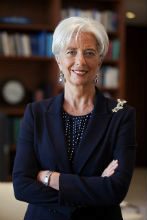WHAT:
International Monetary Fund Managing Director Christine Lagarde, who rarely gives interviews, sat down with Knowledge@Wharton, the Wharton School’s online journal of research and analysis, for an in-depth discussion of the European recession. Knowledge@Wharton met with Lagarde in her Washington, D.C. office in collaboration with ParisTech Review. In the interview Lagarde notes that IMF reforms will shift 6% of current quotas to dynamic emerging and developing countries, “Clearly, the BRICs will be among the recipients of these additional quotas,” which cover voting power and financial contributions. The article delves into Lagarde’s delicate task of restructuring the IMF so that fast-growing emerging economies have a voice in the institution that is commensurate with their increasing economic clout, without alienating other member countries.
WHO:
Christine Lagarde is the Managing Director of IMF. Lagarde is scheduled to speak at the Associated Press meeting today with others, such as President Barack Obama.
WHERE:
The article, which includes an informative Q&A style interview between Knowledge@Wharton and Lagarde can be read and heard here:
- http://knowledge.wharton.upenn.edu/article.cfm?articleid=2968 (transcript)
- http://knowledge.wharton.upenn.edu/audio/120403_KW_Lagarde.mp3 (audio)
WHEN:
April 3, 2012
MEDIA CONTACT:
Please contact Peter Winicov at 215-746-6471 or winicov(at)wharton(dot)upenn(dot)edu for additional information.
About the Wharton School
The Wharton School of the University of Pennsylvania— founded in 1881 as the first collegiate business school — is recognized globally for intellectual leadership and ongoing innovation across every major discipline of business education. The most comprehensive source of business knowledge in the world, Wharton bridges research and practice through its broad engagement with the global business community. The School has more than 5,000 undergraduate, MBA, executive MBA, and doctoral students; more than 9,000 annual participants in executive education programs; and an alumni network of 88,000 graduates.




